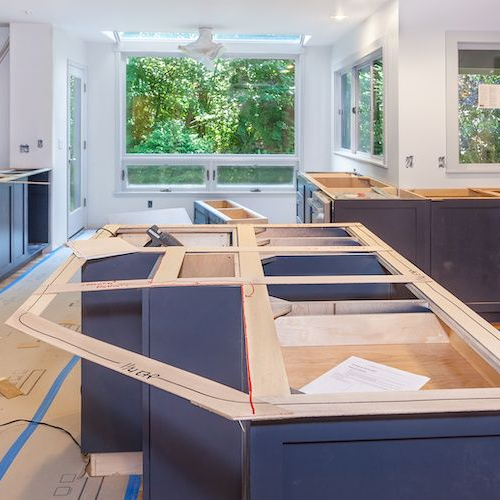What is delayed financing for cash deals?
Contributed by Karen Idelson
Sep 8, 2025
•5-minute read

Cash offers are more appealing to sellers because they offer the opportunity for a faster closing timeline and guarantee the buyer has the funds to purchase the home. Real estate investors and even Airbnb hosts tend to buy with cash, as many tend to have the resources to do so.
Any home buyer can use delayed financing after paying for a house with cash. Delayed financing can offer some significant benefits that come with making an all-cash offer without having all their funds tied up in the property.
Retrieving a portion of your initial investment in a home can come with some hurdles, such as providing documentation to lenders and going through the appraisal process.
Key takeaways
- Cash offers can give buyers a competitive edge. They often appeal to sellers because they allow for faster closings and provide confidence that the buyer has the funds available. Investors and short‑term rental buyers commonly use cash.
- Delayed financing lets buyers use cash first and get a mortgage afterward. This approach allows you to make a strong all‑cash offer and then free up your funds by taking out a mortgage shortly after closing.
- Delayed financing is limited to conventional loans. It isn’t available for FHA, VA or USDA loans, and it allows buyers to avoid the typical six‑month seasoning period required before refinancing.
What is delayed financing?
A typical home buying process is where you get a mortgage to pay for a house. With delayed financing, this strategy entails getting a mortgage with cash-out refinancing after you purchase a property with cash.
With a cash-out refinance, you can essentially free up the cash that was tied in the home and use it for almost any purpose. Some common ways you can use the cash include building up your savings, paying down debt, and financing renovations.
As with other mortgage types, you will need to pay back the loan with interest.
How does a delayed financing mortgage work?
Cash-out refinancing is a type of mortgage where you receive a lump sum of cash. Typically, the new lender will first pay off an existing home loan. Then, any remaining cash will be paid out to you.
Once you have a cash-out refinance loan, you’ll make monthly payments like you would with other types of mortgages.
With delayed financing, you can bypass the usual six-month seasoning period where buyers need to hold off before applying for a new loan. Since you purchased the home in cash (and own the property free and clear), you can apply for financing as soon as you close on the home.
Is the delayed financing process different using government-backed loans?
Unfortunately, you can’t get delayed financing for government-backed loans. That means lenders won’t refinance your home with an FHA, VA, or USDA loan. You can, however, get delayed financing with conventional loans, like ones backed by private lenders such as banks, credit unions, or other financial institutions.
These types of loans have special requirements on properties buyers can purchase, such as the home being in a specific area or the home needing to be in a certain condition. As such, it may not be ideal if you’re an investor or someone who wants to buy a home outright in cash.
You can also get delayed financing with conforming loans, like ones backed by Fannie Mae and Freddie Mac.
Who might want delayed financing?
Buyers that may want delayed financing include buyers who typically make all-cash payments based on properties they purchase.
These buyers include:
- Real estate investors: Homes that are deeply discounted are popular with real estate investors who want to turn a profit. Using all-cash transactions is typical for foreclosed homes, ones put up for auction, and short sale properties.
- Rehabbers: Many traditional lenders don’t offer financing for properties considered fixer-uppers or that need a lot of work. Instead, rehabbers will bypass the lending process initially and pay for a home in cash. Then, they’ll use delayed financing to access their home equity to pay for renovations.
- Airbnb owners: These are a subset of real estate investors who prefer to earn an income from short-term rentals. By purchasing a home in cash and then getting delayed financing, short-term rental investors can finance renovations or free up cash to purchase other properties.
Delayed financing for investment properties
Buying a home with cash is usually faster than with a mortgage, so many investors tend to go this route. Plus, it also helps investors get an offer accepted quicker, especially if the home seller already has multiple offers on their property.
When accessing cash for investment properties, most investors tend to prefer delayed financing. Compared to other financing options, delayed financing is more streamlined, so there are fewer hurdles to get over.
What are the eligibility requirements for delayed financing?
Like with any type of home loan, you will need to meet minimum eligibility requirements for delayed financing:
- Purchased property at arm’s length transaction: This type of transaction means that you don’t have a relationship with the seller beforehand, whether you’re friends, relatives, or have done business in the past. You will need to have purchased a property with this type of relationship, as it can help you avoid allegations of mortgage or tax fraud.
- Provide proof of funds: You will need to show the lender enough documentation with the source of funds you used to buy the home. Documentation could include bank statements showing relevant transactions.
- Meet mortgage loan limits: Lenders will only allow you to get delayed financing up to the home’s purchase price, plus any fees paid for the new loan.
- Have no liens on the property: The home needs to be free of any existing liens and have documentation showing that the buyer paid for the home all in cash.
Pros and cons of delayed financing
Delayed financing could make sense, but it may not be the best choice depending on your situation.
Pros
- Gives you the ability to close faster with cash
- Ability to use loan proceeds for almost any purpose
- Works for almost any type of properties
- Allows you to bypass typical seasoning periods to refinance
Cons
- Only available for conventional home loans
- Must meet delayed financing requirements
- Need to be at or below loan limits
- May need to pay fees to close on the loan
How to get delayed financing
Before purchasing a home, speak with a lender about options for delayed financing. You want to make sure that this type of financing is best suited for your situation. For example, if you really need the cash you’ve set aside for a home purchase upfront, it may be better to get a mortgage first.
If you believe that delayed financing is your best option, compare rates with multiple lenders. Doing so means you can find the best rates and terms based on your financial profile. Be sure to gather all your documentation ahead of time, like bank statements and a gift letter if someone gave you money to purchase the home.
How does an appraisal work with delayed financing?
In most cases, lenders will require a property appraisal for refinance loans. Lenders place this requirement to help reduce their risk and not lend you money that’s more than your property’s current market value.
Your appraisal may come in lower than your purchase price. If so, the delayed financing may not be for your full purchase amount.
The bottom line: Delayed financing can give you an advantage
Delayed financing is a common strategy for home buyers to make all-cash offers, then get access to the money they used to purchase the home. This strategy could be a great option for you, as it can help you purchase properties faster and remain cash-liquid. However, you’re limited to using certain kinds of loans, and lenders may charge closing fees.
Want access to your home equity? Get started by a getting a quote on cash-out refinancing with Rocket Mortgage®.

Sarah Li Cain
Sarah Li Cain is a freelance personal finance, credit and real estate writer who works with Fintech startups and Fortune 500 financial services companies to educate consumers through her writing. She’s also a candidate for the Accredited Financial Counselor designation and the host of Beyond The Dollar, where she and her guests have deep and honest conversations on how money affects our well-being.
Related resources
13-minute read
How to finance an Airbnb rental: A guide for investors
You can get an Airbnb loan to buy houses to use as short-term rentals. Learn how you can use income from Airbnb rentals to get a mortgage.
Read more

8-minute read
Buying a fixer-upper house: Pros and cons
You can buy fixer-upper houses at lower prices and renovate them to enjoy or sell. Learn how this works – and uncover the pros and cons of buying a fixer-...
Read more
6-minute read
How to find investment properties: A guide
There are many ways to find investment properties. Follow our helpful guide for tips on how to find the right one for you.
Read more